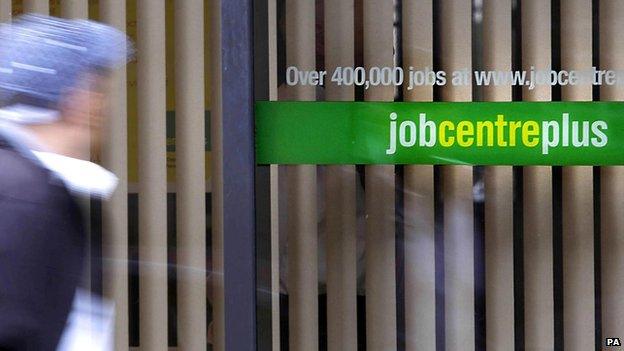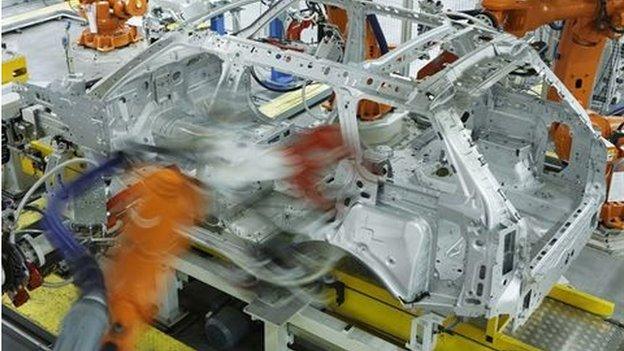Why the productivity gap?
- Published

We like to work in the UK, we have low unemployment, high levels of employment and we put in lots of hours.
The trouble is that when we are at work we are terribly unproductive; we produce less per hour than our main economic rivals.
The difference is pretty dramatic, we produce on average 30% less per hour than workers in Germany, the US and France - we even produce 10% less than the average Italian.
Fridays off?
Leaving aside the fact that those bare statistics should undermine any stereotypes we have about Italian or French workers, they really matter because the more productive we are, the more money we can earn, as individuals and as a country.
Professor John Van Reenen, head of the Centre for Economic Performance at the LSE, makes the point rather graphically: "By Thursday lunchtime the other countries have produced as much as it takes us to produce by Friday afternoon when we knock off work.
"So basically we could take every Friday off if we could be as productive as those other countries and earn the same amount of money."
I don't know about you, but I think taking every Friday off is quite appealing, another way of looking at it is we keep working the same hours and increase our wages by 30%.
Technology
But the big question is: why exactly we are so unproductive?
Economists have identified three main reasons.
For a start, we do not invest enough - our companies don't spend enough on the latest technology or on research and development.
For instance in Germany there are 1,034 R&D staff for every 100,000 people, in the UK there are 883.
Nor do we have the best railways, roads and airports in the world. We all know about the arguments over whether Heathrow should have a third runway or not, it has been going on for years, but Charles de Gaulle airport outside Paris has had four runways for years.
Management
The second major factor is that our companies are not well managed, we are it seems a nation of David Brents - the self satisfied but useless office manager in the sitcom The Office.
Bad management alone accounts for a quarter of the difference between our productivity and our rivals'.
There are plenty of internationally successful and cutting edge companies in the UK, but they are outnumbered by a long tail of businesses with pretty mediocre managers.
In particular, family owned and run businesses seem to be badly managed.
In a sense this is fairly obvious, after all what are the chances that the best person to run a business should just happen to be the eldest son of the last manager?
As Warren Buffet once put it: "Would anyone say the best way to pick a championship Olympic team is to select the sons and daughters of those who won 20 years ago? Giving someone a favoured position just because his old man accomplished something is a crazy way for a society to compete."

Jaguar Land Rover has had billions put into it by parent Tata but some UK facilities are not as productive as German ones
In Germany where there is a even larger section of small and medium sized family owned businesses, the so called Mittelstand, they tend to be run by professional managers.
Bad education
The final point is that not only are our workers poorly managed, they are also in comparison with many of our rivals, poorly educated and poorly trained as well.
This explains why French or US workers get more from the equipment they use than British ones. BMW's mini plant in Oxford apparently struggles to find qualified operators for its machinery and attempts to improve their training with internal qualifications have failed to close that gap.
Of course, some companies do invest heavily and are well managed but they still have to wrestle with skills shortages and bad infrastructure.
Jaguar Land Rover has had billions poured into it since it was taken over by Tata Motors.
But JLR is still not as competitive as its continental rivals says Professor Lord Bhattacharyya, head of the Warwick Manufacturing Group, part of Warwick University: "Productivity is not just about the amount of money they spend on R&D or technology. One of the most modern plants is engine manufacturing at Wolverhampton. A state-of-the-art facility, but they are still not as competitive as German engine plants."
Lord Bhattacharyya blames low skills and bad infrastructure as well as the fact that nearly all the key component suppliers are now based outside the UK.
It all points to a worrying problem, to really deal with low productivity we will have to improve education, skills, investment, infrastructure and management. Just solving one or two factors is probably not going to be enough.
It seems we might just have to get used to those long hours.
- Published14 May 2015
- Published13 May 2015

- Published20 May 2015
- Published14 May 2015